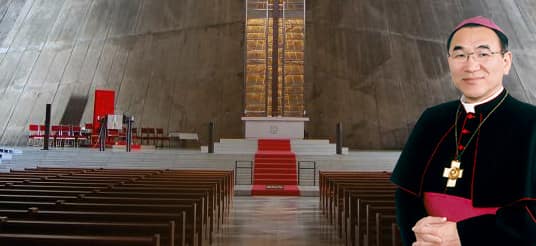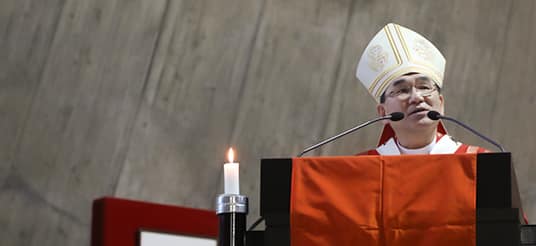Archbishop

Re: The Message from the Apostolic Penitentiary on the Sacrament of Reconciliation and on Granting of Special Indulgence
27/03/2020
26 March 2020
Dear brothers and sisters in the Archdiocese of Tokyo:
Re: The Message from the Apostolic Penitentiary
on the Sacrament of Reconciliation and on Granting of Special Indulgence
On 19 March, the Apostolic Penitentiary released a note on the Sacrament of Reconciliation in the current COVID-19 pandemic. A decree on the granting of special indulgence was likewise issued.
Based on the said notice and the decree issued on the same date, I would like to inform all the faithful of the Archdiocese of Tokyo about the Sacrament of Reconciliation under the present circumstances, as follows:
1: For those who would like to receive the Sacrament of Reconciliation, please consult your parish priest or assistant parish priest. However, though I am aware that the situation for each parish may be different, as a general rule, I have informed the priests of the Archdiocese to refrain from using the “confessional.”
Basically, the Sacrament of Reconciliation will not be celebrated in the conventional closed box-shaped, private room type “confessional.” But rather, it must be celebrated in a meeting room or a reception room where privacy can be maintained, the room being properly ventilated, and where the priest and the penitent can sit at a suitable distance with both of them wearing protective masks.
2: Article 961, Paragraph 1, Item 2 of the Code of Canon Law (Can. 961, §1, 2) provides that, “in cases of grave necessity,” general absolution may be granted. General absolution refers to imparting collective absolution, without prior individual confession, where there is “grave necessity,” such as an imminent danger of death. The Apostolic Penitentiary believes that a case of “grave necessity” has already occurred, especially in places most affected by the pandemic contagion, at this present situation until it subsides.
However, general absolution to every person each time will not be imparted individually, and will only be applicable for occasions when there are several faithful seeking the Sacrament of Reconciliation, all of whom “resolve to confess serious sins in due time, which at that time could not be confessed” (Can. 962, §1) when the situation normalizes.
Each parish may respond differently according to the needs of the situation. However, I have granted permission, on this occasion, to all the parish priests of the Tokyo Archdiocese to provide opportunities to impart general absolution.
3: On the same date, the Apostolic Penitentiary issued a decree granting special indulgences to all the faithful suffering from this pandemic crisis, especially the patients of COVID-19 and their family members, as well as to health care workers. The decree mainly describes the following four points:
“The Plenary Indulgence is granted to the faithful suffering from Coronavirus, who are subject to quarantine by order of the health authority in hospitals or in their own homes if, with a spirit detached from any sin, they unite spiritually through the media to the celebration of Holy Mass, the recitation of the Holy Rosary, to the pious practice of the Way of the Cross or other forms of devotion, or if at least they will recite the Creed, the Lord’s Prayer and a pious invocation to the Blessed Virgin Mary, offering this trial in a spirit of faith in God and charity towards their brothers and sisters, with the will to fulfil the usual conditions (sacramental confession, Eucharistic communion and prayer according to the Holy Father’s intentions), as soon as possible.”
“Health care workers, family members and all those who, following the example of the Good Samaritan, exposing themselves to the risk of contagion, care for the sick of Coronavirus according to the words of the divine Redeemer: “Greater love has no one than this: to lay down one’s life for one’s friends” (Jn 15: 13), will obtain the same gift of the Plenary Indulgence under the same conditions.”
“This Apostolic Penitentiary also willingly grants a Plenary Indulgence under the same conditions on the occasion of the current world epidemic, also to those faithful who offer a visit to the Blessed Sacrament, or Eucharistic adoration, or reading the Holy Scriptures for at least half an hour, or the recitation of the Holy Rosary, or the pious exercise of the Way of the Cross, or the recitation of the Chaplet of Divine Mercy, to implore from Almighty God the end of the epidemic, relief for those who are afflicted and eternal salvation for those whom the Lord has called to Himself.”
“The Church prays for those who find themselves unable to receive the Sacrament of the Anointing of the Sick and of the Viaticum, entrusting each and every one to divine Mercy by virtue of the communion of saints and granting the faithful a Plenary Indulgence on the point of death, provided that they are duly disposed and have recited a few prayers during their lifetime (in this case the Church makes up for the three usual conditions required). For the attainment of this indulgence the use of the crucifix or the cross is recommended.”
Furthermore, an indulgence is not an absolution of sins. According to the Compendium of the Catechism of the Catholic Church, “indulgences are the remission before God of the temporal punishment due to sins whose guilt has already been forgiven.” In addition, indulgences may be applied not only for oneself, but also for those who have already died.
Tarcisio Isao Kikuchi, SVD
Archbishop of Tokyo
Note: Supplementary Information on “Indulgence”
Indulgence is not a substitute for the Sacrament of Reconciliation. At the end of the Sacrament of Reconciliation, the priest imposes an appropriate “penance” to be fulfilled. However, by receiving indulgence, this “penance” is considered fully (plenary indulgence) or partially (partial indulgence) fulfilled.





